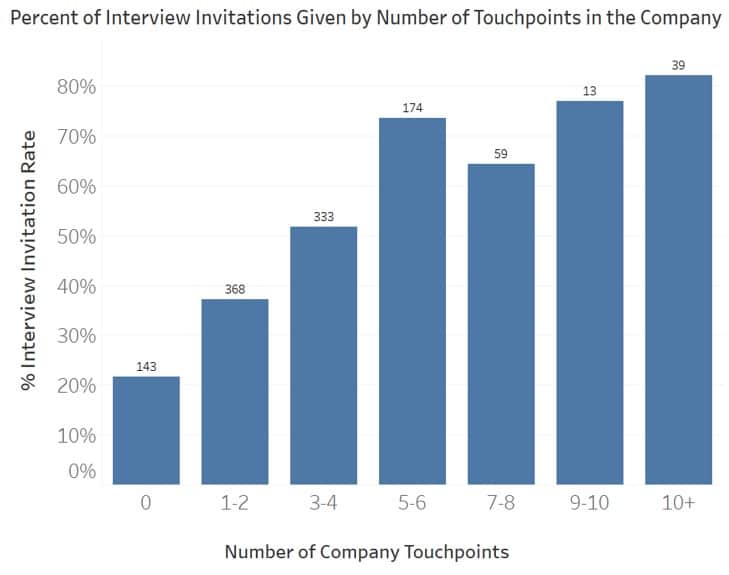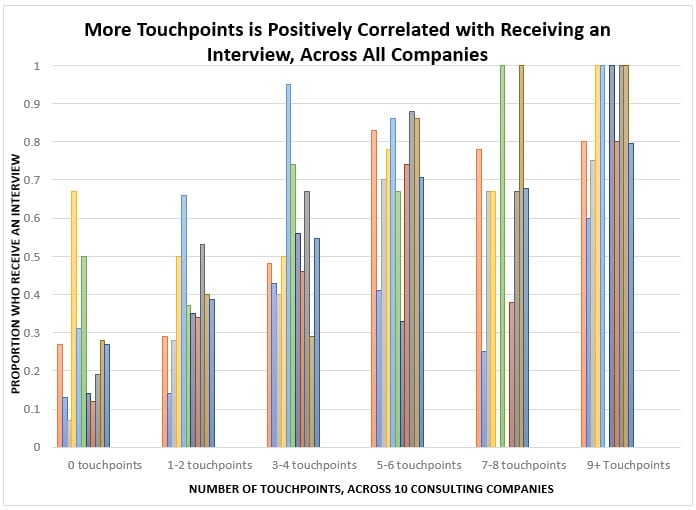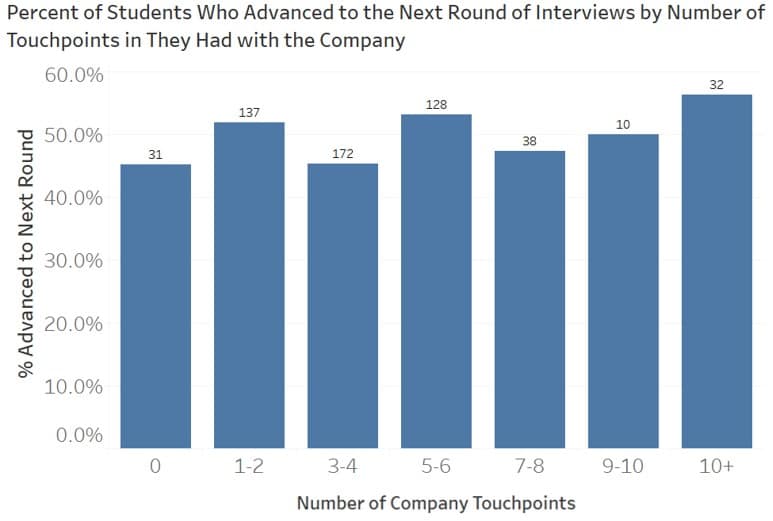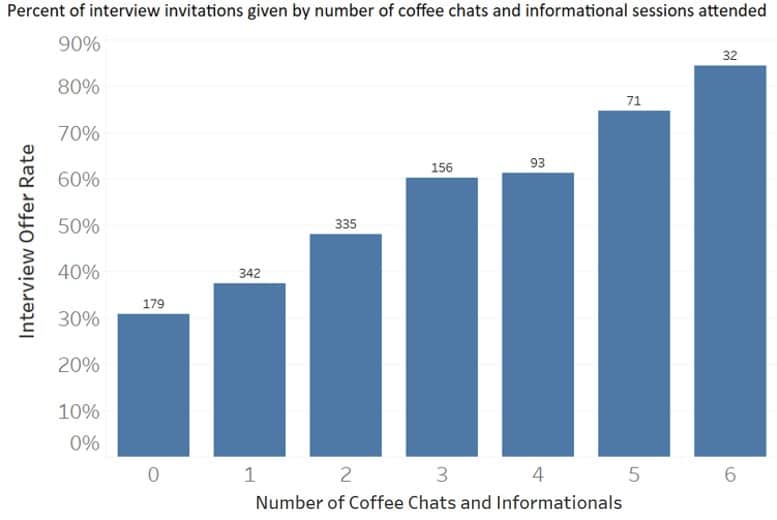We’re flooded with information on a daily basis. As consultants (or those recruiting to be consultants), we’re asked to handle and analyze vast amounts of information. However, while recruiting, how many of us actually pursue a data-driven approach to getting an interview? I know I didn’t. Despite all of the rumors, pieces of advice, and tactics floating around during recruiting, no one seems to know what actually works.
I’m incredibly excited to introduce a data-driven approach to recruiting in this multi-part article series, in partnership with NYU’s Stern School of Business. My ultimate goal with these articles is to provide you with data-based evidence to optimize your recruiting efforts.
The data were gathered from multiple NYU Stern student and recruiting databases and supported by a survey sent to all consulting students (completed at about a 50% rate). The data and survey results span two years, ten major consulting firms, and include 1,500 records representing the recruiting efforts of 219 students.
It’s important to clarify that all findings may be correlation, not causation. Some results may not be reproducible due to biases in the sample, changes year-on-year, etc. Additionally, I will not be disclosing specific company information. However, I hope to at least better guide your recruiting efforts with this series of posts.
Finding #1 – More Contacts Means More Interview Invitations
It’s common knowledge that networking is important. But does the data support this view? For summer internship recruiting in consulting, the answer is “yes”.
The figure below shows how students fared in receiving summer internship interview offers based on the number of company contacts they had. By company contacts, I mean how many people they connected with at the company. A good proxy for this is the number of thank you emails they sent.
Chart 1 – Percentage of Interview Invitations Given by Number of Touchpoints in the Company.
Note: The numbers above each bar represent the number of records in that category. One record represents one student submitting an application to one company. For example, 368 applications were submitted where the student had 1-2 company contacts. In this case, 37% received an interview. A given student could be represented 10 times in this data set if they applied to ten separate companies.
Source: Stern Student Records and Student Survey.
Finding #2 – Every Company is High Touch
Most of you have read or heard that certain companies are more low touch or high touch. This can be in general, or specific to your school. However, the data show quite clearly that every company is high touch.
Chart 2 – Relationship between Number of Touchpoints and Receiving an Interview.
Source: Stern Student Records and Student Survey.
Finding #3 – Networking Drives Recruiting Success
You might be wondering, “Do good networkers get interviews because they demonstrate desirable consultant traits, or because of the contacts they made?” It seems the answer is “Contacts!” Contacts matter in that they fundamentally increase your odds of getting an interview.
If we look at how students fared in advancing past the first round (either receiving an offer or advancing to a second round if there was one), we can see that there really is no relationship between the number of touch points and the likelihood of getting past the first round of interviews (see Chart 3 below).
The first conclusion we can draw from this is that individuals who have more company contacts may not inherently be better candidates; they are not more likely to make it past round one. However, it also implies that the positive correlations observed in the charts above are not mere correlation; those who network really do change their fates and are more likely to get a first round interview as a result of networking.
Chart 3 – Relationship between Advancing to Next Round and Number of Touchpoints.
Source: Stern Student Records and Student Survey.
Finding #4 – Company-Sponsored Events Matter
You might also be wondering how important it is to attend company-sponsored coffee chats and informational sessions. The answer? Very important, as Chart 4 below shows.
Of course, the number of company-sponsored events that you attend is not independent of the number of touchpoints you have, but they are not pure substitutes either.
Chart 4 – Relationship between Interview Offer Rate and Number of Coffee Chats/Informationals.
Source: Stern Student Records and Student Survey.
Finding #5 – Contacts and Coffee Chats Are Very Important
Finally, in a Naïve Bayes regression predicting the likelihood of being interviewed, company contacts and coffee chats were ranked the 5th and 8th most important predictors, respectively, among 23 predictors. This, combined with the clear positive relationship between these indicators and interview chances, demonstrates the importance of networking.

Note: The source column represents the predictor variable. The dependent variable was “Offered Interview?” and the regression run was a Naïve Bayes. Misclassification rate was .259 with 1,260 total valid observations. Other regressions ranked touch points and coffee chats/informationals similarly (albeit not exactly).
Source: Stern Student Records and Student Survey.
To clarify, the higher the logworth of a variable, the more predictive power it has. The lower the P-Value, the surer we can be of its importance. Importantly, .05 is generally considered the threshold under which a P-Value demonstrates predictive value of the variable. Both the number of company touch points and the number of coffee chats/informationals have high predictive power.
Conclusion: Network!
These are only suggestive results; they do not prove definitively that networking improves your odds. However, my analysis shows that increasing the number of contacts at a company is strongly positively correlated with obtaining an interview. Additionally, the data show that you should pursue this strategy for every company you’re interested in, not solely for those that you view as high touch.
Stay tuned for more data-driven recruiting insights!
Ian Glennon is an ex-MBB consultant who currently offers one-on-one coaching sessions to help you nail your consulting interview. Find out more here.
Image: Pexels





0 replies on “Data-Driven Recruiting (Part 1 – Networking)”
[…] Read more © All right reserved. […]